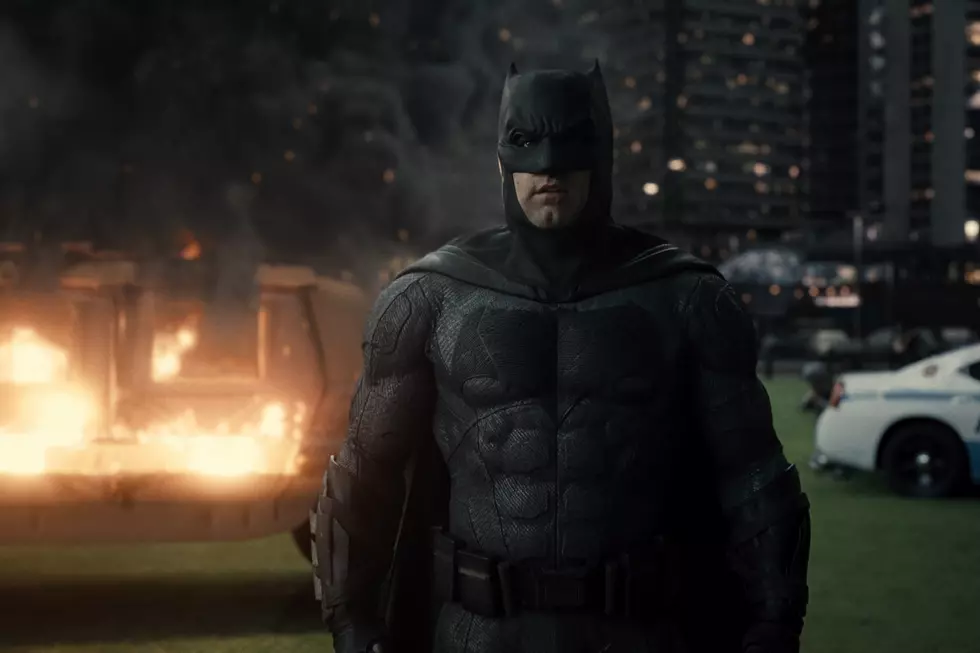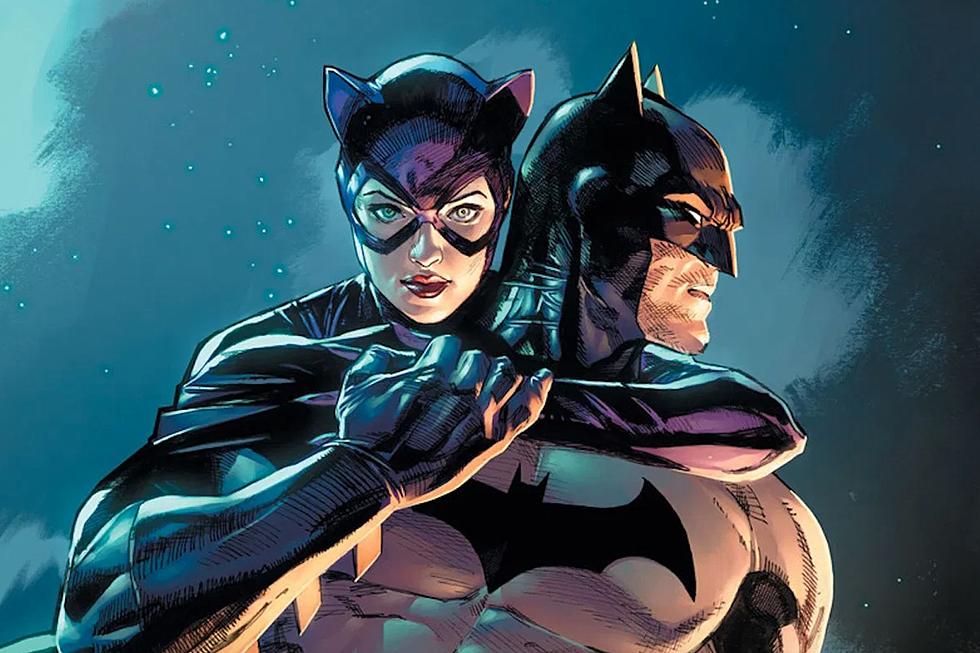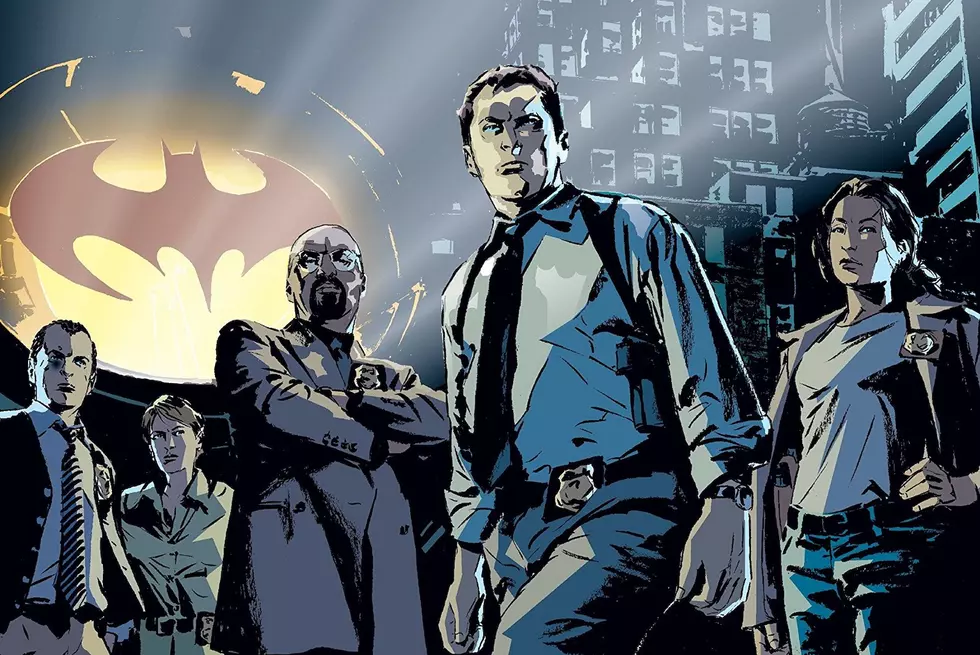
Scott Snyder Talks ‘Batman: Zero Year': ‘It’s Become Something That’s As Ambitious As I Can Make It’

Last week, DC announced that Scott Snyder and Greg Capullo would be doing an updated origin for Batman in the pages of Zero Year, starting in June's Batman #21. Considering that Frank Miller and David Mazzucchelli's Batman: Year One has been the definitive origin story for the Dark Knight since its release in 1987, it probably won't surprise anyone that reaction to the news was mixed, with plenty of apprehension from long-time fans over whether Snyder and Capullo were setting out to replace one of the cornerstones of the modern DC Universe with something that would cover stories that were well-trod already.
For Snyder, though, it's not a matter of replacing Year One, it's about preserving what works while building something new around it. We spoke to him about how the project came about, what his goals are, and the fear and anxiety that comes from throwing himself into the shadow of what he calls "a masterpiece."ComicsAlliance: When I heard about Zero Year, I was a little apprehensive. It's pretty well-trod ground, but I know you're a guy who really likes Year One. I mean, you're the one who brought James Gordon Jr. back into continuity.
Scott Snyder: Right. Year One is literally one of my two favorite pieces of graphic literature ever, with the other one being The Dark Knight Returns. I would never, ever go there to tear that apart.
CA: So does that intimidate you, to take on Batman's origin story, if that's what Zero Year is?
SS: I'll be totally frank with you. We've sort of danced around it, but it is the origin story. It goes back to show how Bruce became Batman in the New 52 continuity. I'm incredibly intimidated and incredibly nervous, and have had horrible sleepless nights and panic attacks about it already, I promise you.
But the reason I'm doing it, again, to be totally straight, is that I wanted to do an "early years" story that was really different. I had an idea for one that would just cut away from what you've seen before, before I was even doing the #0 issue. The #0 issue gave me the chance to do it a little bit, in a world I wanted to sort of create, and it was definitely the quietest moment in the story I had in mind, but would give you a window into it to see how people liked it. I really fell in love with that world there, and I started thinking about doing another "early years" story after I did Joker, and after Damian died.
For one thing, Pete Tomasi and Pat Gleason, who are both good friends and guys that I admire tremendously, and whose book I look up to all the time, had been doing such a good job with Damian and Bruce that I felt like it would be a good time to give them the pieces on the board to deal with that relationship, and not mine that same vein. What happened was that I was developing the story, and it got bigger and bigger, not just in length, but bombastically and in a fun way. It became a thing where I was working around the pieces of Year One, so that I could show the readers, look, this is still there, this is still there, and this part is there too.
 It became clear to me that the more people asked at cons and on Twitter about different moments in Batman's history to see if they were still there in the New 52 that most of my favorite stuff from Year One wasn't there anymore. James Jr. would be six years old in the New 52, if Year One happened the way you saw it. Selina has a completely different origin story, Barbara Gordon has a completely different origin story, Jim Gordon has a different origin story, the Falcone gang has a different origin story. It became clear that it just doesn't exist in continuity the way that I hoped it would when we began the New 52.
It became clear to me that the more people asked at cons and on Twitter about different moments in Batman's history to see if they were still there in the New 52 that most of my favorite stuff from Year One wasn't there anymore. James Jr. would be six years old in the New 52, if Year One happened the way you saw it. Selina has a completely different origin story, Barbara Gordon has a completely different origin story, Jim Gordon has a different origin story, the Falcone gang has a different origin story. It became clear that it just doesn't exist in continuity the way that I hoped it would when we began the New 52.
Nobody was more protective of Batman's history than those of us who were working in the Batman books. Me, Gail Simone, Kyle Higgins, Pete Tomasi, we all wanted to keep everything the way it was, but as the New 52 progressed, it's become an environment where people came up with stories they loved that, little by little, rewrote parts of that history. So as much as I like to think that a lot of those stories still happened, and I try to reference them as much as I can, like No Man's Land, or a ton of stuff that we referenced with the Joker, the basic bones of Year One can't have happened the way they were presented in that book.
So it became a thing of, if you're not going to do a reclamation of that book, or a project where you're showing pieces of Year One, show the story you're going to tell. Do what you can to protect the pieces of Year One that could've happened there, but don't make the story about trying to make readers feel okay or safe about what's still there or not. Do a story that, hopefully, we can be proud of, and that's different and new, without treading on Year One, without tearing it apart. Just say "I have a story that's very different, it will show you things you've never seen before."
That's something I'm very cautious about. I don't want to do a story that's treading on stuff you've seen, but to do something that, even though I know in my heart, dude, I can't write something as good as Year One. It's just not going to happen, it's a f**king masterpiece. I read it over and over, I teach it in class every year, and every year I find something new that I love about that book. But if I approached Joker that way and said "I'm never going to write something as good as the Killing Joke, so I won't do a big Joker story," or "I'm never going to write something as good as Year One, so I'm not going to touch Bruce's early years," then I feel like I wouldn't have done anything I was excited about on the book.
I can promise you guys on my kids, honestly, this is the best story that I have come up with, in my opinion, for Batman. It's the one that I'm proudest of for its originality and ambition. If I didn't do it because I said "you know what, it's not as good as Year One," when there's no Year One in the New 52 in terms of its entirety, then I'd be doing a disservice. I teach a class where the goal of the class is that you have to write the story that you want to read the most, even if you think that no one will like it, even if it's not the smartest or the best. Whatever it is, if it's funny, if it's political, if it's superheroes, if it's memoirs, you have to do that.
That's one of the reasons I like teaching, it makes me come home and try to stay honest about it. I'm incredibly nervous, yes, 100%. But I'm also 100% proud of this story. I really hope you guys love it. I'm really scared, but I promise you that I'm only doing it because I think it's the best thing I've done so far.
CA: Part of my curiosity about it was wondering how much of it, if any at all, was motivated by you being the guy who called dibs on the Joker. You very clearly wanted to do the first big Joker story in the New 52, you wanted you and Greg Capullo to be the guys who reintroduced him with "Death of the Family." How much of Zero Year was you wanting to stake a claim and be the guy who did the origin story for Batman that we're going to have for the forseeable future? Was it a matter of you just wanting to do a story of Batman's early years, or was it "If I don't do it, someone else is going to, so I have to preserve what I like."
SS: I definitely don't perceive thinking that I wanted to be the guy to do it. That, I can promise. That sort of sentiment doesn't really cross my mind. Believe it or not, all of this stuff is pretty overwhelming to me personally, I didn't start in comics to be handling things as big as this. I'm from a short story prose background, in terms of my ambitions, I never expected to be able to write these characters on the scale that I am. It's not something that I approached saying "I have to be the guy who gets to do Batman's origin."
 It wasn't the idea of not wanting to let someone else do it, it was more that something comes up. They said to us at DC, we want to take the Joker away for a little while so you have room to build new villains, and I had the Court of Owls story in mind. They said we wanted to bring him back, and asked who wants to do it. We had a meeting, me, Pete Tomasi and a couple of other guys, and we all sort of talked about different stories, and the one that I put forward and started to make was the one that I had in mind for a while. It was an early version and a lot changed over time, but we said, okay, Pete has a story planned with Damian, and it was either that or Detective. Tony Daniel wasn't sure how long he was going to stay on Detective, so it became "Let's do it in Batman."
It wasn't the idea of not wanting to let someone else do it, it was more that something comes up. They said to us at DC, we want to take the Joker away for a little while so you have room to build new villains, and I had the Court of Owls story in mind. They said we wanted to bring him back, and asked who wants to do it. We had a meeting, me, Pete Tomasi and a couple of other guys, and we all sort of talked about different stories, and the one that I put forward and started to make was the one that I had in mind for a while. It was an early version and a lot changed over time, but we said, okay, Pete has a story planned with Damian, and it was either that or Detective. Tony Daniel wasn't sure how long he was going to stay on Detective, so it became "Let's do it in Batman."
With the origin, it's sort of a combination of those things. I have an "early years" story in mind, and I see what Pete has planned, and it's awesome. It really mines Bruce's grief in the present and the Joker fallout from Death of the Family is in a lot of those books as well, with Damian too, boiling up with his death and the Joker stuff. For me, I thought, well, it's a good chance to give other people room to play in the present and I can do this.
Then, as the story grows, part of it is that I really do feel in some ways like I'm going to get kicked off. I have this paranoia that I'm only going to get one chance to write one more arc before I get axed. I've always been that way, even when I was doing prose, it was like "I'm only going to get one chance to write a book before they realize I'm a fraud." You're sort of propelled by that feeling that, if I only get one chance, I better go big. You have to tell the story that I'll feel okay if I never get another chance. The Joker story was, for me personally, some of the deepest meditation and the biggest story, and Zero Year isn't just that early years story. It's become something that's as ambitious as I can make it, because what if I never get another chance to write Batman?
CA: It seems like it's an interesting place in the context of your run to put a big flashback story. Going even from your run on Detective Comics, a lot of your stuff has thematically been about bringing back the past. James Jr. comes back, Tony Zucco's daughter is in there. The Court of Owls is all about bringing back Thomas Wayne Jr., who's a literal embodiment of Batman's past.
SS: Yeah.
CA: Then you get to the death of Damian, who, again, was a product of the past, if you want to go back to Morrison bringing him back from Son of the Demon. That story was one that you weren't the primary writer on, but it affects those books. Now the focus is shifting from bringing that stuff back to actually doing a whole story set in those early years, when there's a very important thing for Batman to be dealing with in the present. Does it take the pressure off you to work in this big family of titles, where Tomasi and Morrison are dealing with that huge event?
SS: Yeah. One of the joys of working in that world is how generous Grant Morrison has been to me personally. When I've seen him at cons and gotten a chance to tell him what was coming up in Batman or Detective, that was the highlight of my year. To meet him at San Diego and say "Grant, I'm geeking out, this is what I'm doing." He's been so generous to me, and Pete has been an incredible friend, I'm really close to him. This isn't PR. I'm sure that there are people I'm not close to or that I don't know at DC, but these guys have been great.
I know what's coming up in Batman Inc., and I know what's coming up in Batman and Robin, and those guys are dealing so deeply with Bruce's grief, in a big, crazy way, that it feels like it's an okay time for me to do a story that's set in the past and does something different, to give those guys the room to deal with what's happening.

The truth is that Damian's only appeared in a few pages in everything that I've done. As much as I love that character, I just don't feel like our book is the one that should be handling the real impact of that death. The stuff that happened with the Joker definitely plays out in the other books, and when we get back too, as does the stuff with Damian. Right now, it felt like a good time that would be exciting, I hope, to fans, that was entirely our own.
Part of it, maybe, was that it's been really fun to do these big, collaborative stories that become events or crossovers, but it's also really nice to do this. Part of it was saying "for two years, we've done these stories, Owls and then Joker, where we were so all tied together," and it was fun and inspiring for me personally to get to write with these guys that I really like, but it was also really f**king nice to say "I want to do a story like Black Mirror that's going to be my own, that's big, that touches on themes that are important to me, that doesn't need to spread into anything else." It can just be mine and Greg's.
CA: Was it a difficult pitch? Was there resistance when you brought it up? Did they have the question of "yeah, you know we've got Year One, right?" [laughs]
SS: They were pretty open, honestly. DC knew I had an early years story, and they said to me, editorial said, we want to do Batman's origin in the New 52. We need it. We've done Wonder Woman's. We've done Superman's. But Batman's is still a mystery. And my first thought was that's crazy, we kept everything, but then I started thinking about it, and it became clear to me that basically none of Year One was still in continuity. James Jr. would be six years old. Selina's origin is different. Falcone's. Jim Gordon's. So it became a matter of saying, if it's not there, if Year One is not, then this story I'm working on, this early years story, could be something that goes deeper than I expected. It can give fans something different than anything they've seen. Not to replace Year One, but because there is no Year One. So go big. Try to make something special. Something that honors books like Year One not by re-treading it, but by doing something different, but -- hopefully -- fearless, the way that book is fearless. This won't be as good as Year One, most likely. But it'll be our best effort to give you guys something new and special that you can point to and say, they tried to do something exciting on this book. So without giving spoilers, the book will definitely cut away from the tone of Year One. It'll be something very different.
It's definitely my own rope that I'm hanging myself with. If anybody out there hates it, it's me, it's not DC's fault, it's mine. It's the story that i really wanted to tell, and Greg's always the first person I tell. I'm like, "what do you think, do you want to draw this thing for a whole year?" He liked it, and I liked it, so we thought, let's do it.
CA: You talk about it being a year, and it's eleven issues.
SS: Yeah.
CA: Why? [laughs]
SS: I always make the joke that it's because I'm wordy, but you'll see when it opens up that it has a structure that, hopefully, supports the length. It's a different kind of story than we've done with Owls and Black Mirror, which were both this length. Both of those stories ran about eleven issues, and when I say ahead of time that Black Mirror's going to run about eleven issues, it sounds so damn long. I totally understand the apprehension, but this has more packed into it than either of those. Hopefully you guys'll see and think we made the right decision.
CA: One of the things I mentioned when I wrote the Ask Chris article about it was that since Year One and its phenomenal success, there's been a sub-genre of Batman: Year One stories set in those early years. I talked about the Matt Wagner books, the Jeph Loeb/Tim Sale books, Legends of the Dark Knight, The Man Who Laughs... So there's been a lot done with this. There's been a lot done that's worked around Year One, so does that open up possibilities for you since it's a sort of accepted genre of Batman stories?
SS: It's still intimidating, because those are terrific. I read The Man Who Laughs or Long Halloween and Dark Victory, and it's still intimidating. But it's still, at the end of the day, the best story I have. I don't mean that like "I have other stories I could do," this is the story I'm passionate about. It's really scary for us, too, and we hope that what you guys will like about it is that we're trying to be bold and do daring things with the book, but still stay true to the core of the character, and still give you something new and different.
CA: Along those same lines, you and I have talked about Batman. We've both read a lot of Batman comics, I think, and it makes me wonder if you worry that the type of fan that's been through all that stuff is going to be open to what you're doing. Do you have in your head that this is for the new reader, the person who saw the movie and was lured in by the New 52 and wants to know about Batman? Is there a target audience in mind?
SS: I think about those fans a lot. I'm an old fan in the way that, when the 52 happened, we fought really hard to keep everything we could from the past when we had the opportunity to change everything and start blank, from Joe Chill to the present. It's not something that I think "who cares" or whatever. What I'd try to stress for fans is that it's become clear that there's no origin for the New 52. Year One just doesn't track anymore. All of these things that are incongruous with how the New 52 is set up have become impossible to ignore, so you think to yourself that if that's not there, it's a chance to do something new that could be special. So you take it.
CA: We've talked about Year One a lot, because there's really no getting around it, but are there other origins that you have memories of? I feel like we get into Batman as kids, because we like, for me, the '66 TV show and Super Friends, where they never mention that his parents were murdered in an alley. Then there's the moment where you find out, whether it's in Batman Begins or Batman '89, or, for me, The Untold Legend of the Batman miniseries. Do you remember the moment where you read his origin for the first time?
SS: I don't really remember when I learned it, because he's always been such a part of my imaginative landscape. I do remember reading Year One, and Dark Knight Returns before that, where the origin is done so brutally in that. The slow-motion paneling of the bullet and the casing and the pearls, that stuff. That's the one I remember most vividly, the brutality of that scene, the emotional brutality. So devastating, I think.

CA: This might be getting into dangerous territory, but I want to do a lightning round, where I say something and you tell me if you'll be exploring it in Zero Year.
SS: You totally can, but I'm warning you: I will probably say "no comment" through a lot of these.
CA: Okay, you ready? The dinosaur.
SS: I hope so. I'm trying to fit it in.
CA: The giant penny.
SS: No comment.
CA: The giant Joker card.
SS: We already did that! That was in Death of the Family.
CA: The bat crashing through the window.
SS: No comment.
CA: Alfred's past.
SS: Yes, we are.
CA: Batman's Batman-shaped kneepads.
SS: [Laughs] I'll try to throw it in just for you.
More From ComicsAlliance









